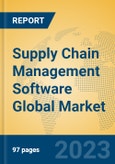Market Size and Growth Forecast
The global Supply Chain Management Software market was valued at USD 17.6-28.9 billion in 2024, with an estimated CAGR of 8.0%-10.0% from 2025 to 2030, driven by digital transformation and e-commerce growth.Regional Analysis
- North America is projected to grow at a CAGR of 7.5%-9.5%, with the United States leading due to its strong e-commerce and manufacturing sectors. Trends include AI-driven SCM solutions for retail and logistics.
- Europe is expected to achieve a CAGR of 7.3%-9.3%, with Germany and the UK driving demand. The region focuses on SCM software for automotive and industrial manufacturing, supported by sustainability goals.
- Asia Pacific is anticipated to record the highest growth at 8.5%-10.5%, driven by China and India. China’s logistics and manufacturing hubs fuel demand for cloud-based SCM solutions, while India emphasizes e-commerce logistics.
- Rest of the World, particularly Brazil and South Africa, is expected to grow at 7.0%-9.0%, with trends toward SCM software for retail and industrial applications.
Application Analysis
- Retail applications are estimated to grow at a CAGR of 8.2%-10.2%, driven by e-commerce and inventory management needs. Trends include real-time tracking and AI-driven demand forecasting.
- Wholesale & distribution applications are projected to expand at 8.0%-10.0%, focusing on logistics optimization. Trends include blockchain for transparency.
- Logistics service applications are expected to grow at 7.8%-9.8%, emphasizing real-time visibility. Trends include autonomous logistics solutions.
- Automotive, consumer goods, industrial manufacturing, life sciences, and other applications are anticipated to rise at 7.5%-9.5%, focusing on supply chain resilience and sustainability.
Type Analysis
- Supply chain planning is estimated to grow at a CAGR of 8.2%-10.2%, driven by AI-driven forecasting. Trends include predictive analytics.
- Supply chain logistics is projected to expand at 8.0%-10.0%, focusing on real-time tracking. Trends include IoT integration.
- Manufacturing, product lifecycle management, and enterprise asset management are expected to grow at 7.5%-9.5%, emphasizing automation and sustainability.
Key Market Players
SAP, headquartered in Walldorf, Germany, offers comprehensive SCM software with AI and cloud-based solutions for retail and manufacturing.Blue Yonder Group, based in Scottsdale, USA, specializes in AI-driven SCM solutions for logistics and retail.
Oracle, located in Austin, USA, provides cloud-based SCM software for global supply chain management.
Infor, based in New York, USA, offers SCM solutions for manufacturing and distribution, focusing on scalability.
Porter’s Five Forces Analysis
- The threat of new entrants is moderate. High R&D costs and established platforms create barriers, but cloud-based solutions attract niche players.
- The threat of substitutes is moderate. Manual processes and legacy systems compete, but SCM software’s efficiency maintains its edge.
- Buyer power is moderate. Large enterprises negotiate pricing, but specialized features limit leverage.
- Supplier power is low. Cloud infrastructure is widely available, reducing supplier influence.
- Competitive rivalry is high. Key players differentiate through AI, cloud, and blockchain integration.
Market Opportunities and Challenges
Opportunities
- E-commerce growth drives demand for SCM software in retail and logistics.
- AI and blockchain enhance supply chain efficiency and transparency.
- Emerging markets offer growth potential due to industrialization.
- Sustainability-focused modules align with environmental goals.
Challenges
- High implementation costs limit adoption in smaller enterprises.
- Data security concerns challenge cloud-based SCM solutions.
- Regulatory compliance increases development costs.
- Supply chain disruptions impact software deployment.
Growth Trend Analysis
The SCM Software market is growing rapidly, driven by digital transformation. On October 1, 2024, Körber Supply Chain Software acquired MercuryGate International, enhancing its transportation management offerings. On October 15, 2024, Syntax Systems acquired Argon Supply Chain Solutions, strengthening its warehouse management capabilities. On October 29, 2024, Sagard NewGen acquired FuturMaster, a SaaS provider for supply chain planning. On January 24, 2025, Aptean acquired Logility Supply Chain Solutions, boosting its AI-driven SCM portfolio. On June 10, 2025, Kaleris acquired Locus Software, expanding its ocean carrier solutions. These developments align with a projected CAGR of 8.0%-10.0% through 2030.This product will be delivered within 1-3 business days.
Table of Contents
Companies Mentioned
- SAP
- Blue Yonder Group
- Oracle
- Infor
- Manhattan Associates
- Epicor
- IBM
- Creactives
- Kinaxis
- E2open
- HighJump
- Descartes Systems Group








